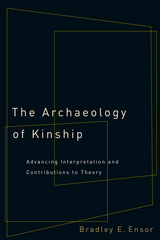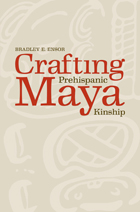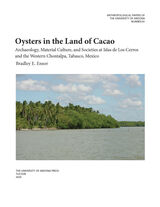3 books about Ensor, Bradley E.

The Archaeology of Kinship
Advancing Interpretation and Contributions to Theory
Bradley E. Ensor
University of Arizona Press, 2013
Archaeology has been subjected to a wide range of misunderstandings of kinship theory and many of its central concepts. Demonstrating that kinship is the foundation for past societies’ social organization, particularly in non-state societies, Bradley E. Ensor offers a lucid presentation of kinship principles and theories accessible to a broad audience. He provides not only descriptions of what the principles entail but also an understanding of their relevance to past and present topics of interest to archaeologists. His overall goal is always clear: to illustrate how kinship analysis can advance archaeological interpretation and how archaeology can advance kinship theory.
The Archaeology of Kinship supports Ensor’s objectives: to demonstrate the relevance of kinship to major archaeological questions, to describe archaeological methods for kinship analysis independent of ethnological interpretation, to illustrate the use of those techniques with a case study, and to provide specific examples of how diachronic analyses address broader theory. As Ensor shows, archaeological diachronic analyses of kinship are independently possible, necessary, and capable of providing new insights into past cultures and broader anthropological theory. Although it is an old subject in anthropology, The Archaeology of Kinship can offer new and exciting frontiers for inquiry.
Kinship research in general—and prehistoric kinship in particular—is rapidly reemerging as a topical subject in anthropology. This book is a timely archaeological contribution to that growing literature otherwise dominated by ethnology.
The Archaeology of Kinship supports Ensor’s objectives: to demonstrate the relevance of kinship to major archaeological questions, to describe archaeological methods for kinship analysis independent of ethnological interpretation, to illustrate the use of those techniques with a case study, and to provide specific examples of how diachronic analyses address broader theory. As Ensor shows, archaeological diachronic analyses of kinship are independently possible, necessary, and capable of providing new insights into past cultures and broader anthropological theory. Although it is an old subject in anthropology, The Archaeology of Kinship can offer new and exciting frontiers for inquiry.
Kinship research in general—and prehistoric kinship in particular—is rapidly reemerging as a topical subject in anthropology. This book is a timely archaeological contribution to that growing literature otherwise dominated by ethnology.
[more]

Crafting Prehispanic Maya Kinship
Bradley E. Ensor
University of Alabama Press, 2013
By contextualizing classes and their kinship behavior within the overall political economy, Crafting Prehispanic Maya Kinship provides an example of how archaeology can help to explain the formation of disparate classes and kinship patterns within an ancient state-level society.
Bradley E. Ensor provides a new theoretical contribution to Maya ethnographic, ethnohistoric, and archaeological research. Rather than operating solely as a symbolic order unobservable to archaeologists, kinship, according to Ensor, forms concrete social relations that structure daily life and can be reflected in the material remains of a society. Ensor argues that the use of cross-culturally identified and confirmed material indicators of postmarital residence and descent group organization enable archaeologists—those with the most direct material evidence on prehispanic Maya social organization—to overturn a traditional reliance on competing and problematic ethnohistorical models.
Using recent data from an arch aeological project within the Chontalpa Maya region of Tabasco, Mexico, Ensor illustrates how archaeologists can interpret and explain the diversity of kinship behavior and its influence on gender within any given Maya social formation.
[more]

Oysters in the Land of Cacao
Archaeology, Material Culture, and Societies at Islas de Los Cerros and the Western Chontalpa, Tabasco, Mexico
Bradley E. Ensor
University of Arizona Press, 2020
For decades, the Chontalpa region of Tabasco, Mexico, conjured images of the possible origins of the Itzá, who migrated, conquered, or otherwise influenced much of Mesoamerica. In Oysters in the Land of Cacao, archaeologist Bradley E. Ensor provides an important resource for Mesoamerican Gulf Coast archaeology by offering a new and detailed picture of the coastal sites vital to understanding regional interactions and social dynamics.
This book synthesizes data from multiyear investigations at a coastal site complex in Tabasco—Islas de Los Cerros (ILC)—providing the first modern, systematic descriptions and analyses of material culture that challenge preconceptions while enabling new perspectives on cultural developments from the Formative to Late Classic periods through the lens of regional comparisons and contemporary theoretical trends. Ensor introduces a political ecological understanding of the environment and archaeological features, overturns a misconception that the latter were formative shell middens, provides an alternative pottery classification more appropriate for the materials and for contemporary theory, and introduces new approaches for addressing formation processes and settlement history.
Building on the empirical analyses and discussions of problems in Mesoamerican archaeology, this book contributes new approaches to practice and agency perspectives, holistically integrating intra- and interclass agency, kinship strategies, gender and age dynamics, layered cultural identities, landscapes, social memory, and foodways and feasting. Oysters in the Land of Cacao addresses issues important to coastal archaeology within and beyond Mesoamerica. It delivers an overdue regional synthesis and new observations on settlement patterns, elite power, and political economies.
This book synthesizes data from multiyear investigations at a coastal site complex in Tabasco—Islas de Los Cerros (ILC)—providing the first modern, systematic descriptions and analyses of material culture that challenge preconceptions while enabling new perspectives on cultural developments from the Formative to Late Classic periods through the lens of regional comparisons and contemporary theoretical trends. Ensor introduces a political ecological understanding of the environment and archaeological features, overturns a misconception that the latter were formative shell middens, provides an alternative pottery classification more appropriate for the materials and for contemporary theory, and introduces new approaches for addressing formation processes and settlement history.
Building on the empirical analyses and discussions of problems in Mesoamerican archaeology, this book contributes new approaches to practice and agency perspectives, holistically integrating intra- and interclass agency, kinship strategies, gender and age dynamics, layered cultural identities, landscapes, social memory, and foodways and feasting. Oysters in the Land of Cacao addresses issues important to coastal archaeology within and beyond Mesoamerica. It delivers an overdue regional synthesis and new observations on settlement patterns, elite power, and political economies.
[more]
READERS
Browse our collection.
PUBLISHERS
See BiblioVault's publisher services.
STUDENT SERVICES
Files for college accessibility offices.
UChicago Accessibility Resources
home | accessibility | search | about | contact us
BiblioVault ® 2001 - 2024
The University of Chicago Press









